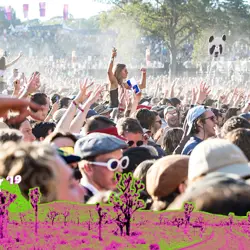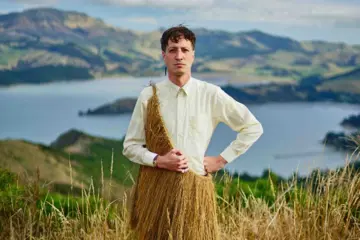 Splendour In The Grass
Splendour In The GrassWith each music festival season come new green initiatives. This summer, the first shot fired is Camping Buddy from Green Music Australia.
It’s a free web app which provides tips on how not to give Mother Nature a black eye by leaving a pigsty behind or unnecessarily adding to landfill after the event. Camping Buddy allows them to build an interactive packing checklist, plan ahead, and make smarter packing decisions. Like leaving those cheap inflatable couches and foam fingers at home, and just go with the essentials. Other features include weather updates and promoting festival hire services.
“One plastic tent is the equivalent of 8,750 straws,” points out Green Music Australia CEO, Berish Bilander. “When people abandon cheap single use tents at their campsite, they leave behind massive environmental damage. By using camping equipment which is built to last and borrowing items before buying, we can significantly reduce the number of camping items which end up in landfill each year.”
Waste at festivals is a major environmental hazard in Australia. Research commissioned by Green Music Australia found that 50 to 80 percent of waste generated at festivals comes from campsites. Cheap broken tents and gazebos are a primary cause of littering, linked to poor last-minute purchasing decisions and inexperienced camping in rain and high winds.
“With festival organisers already facing increased adverse impacts from the climate crisis and extreme weather events, many are looking for ways to improve their environmental performance and encourage their audiences to care for Country,” the association stated.
Don't miss a beat with our FREE daily newsletter
Green Music Australia set up Camping Buddy with the Queensland University of Technology. Funded by the NSW Environmental Trust, the idea for Camping Buddy emerged during a 4-year research and IT creation project grant which saw them undertake the challenge of using technology to tackle the problem.
Partner Festivals
The website launched this week with Strawberry Fields, Splendour In The Grass and Lost Paradise – who have their own slate of green initiatives – among its partners.
Tara Medina, Director of the sold out Strawberry Fields (running November 17 to 19 in Tocumwal, NSW) emphasised, “Sustainability is a core focus for Strawberry and we pride ourselves on being early adopters and champions of new initiatives that promote overall waste minimisation whilst empowering our patrons to make greener choices. Camping Buddy gets our vote as a mechanism to help attendees to plan, pack and party with sustainability in mind.”
Strawberry Fields is insistent its patrons be aware of its sustainability initiatives before they arrive. One is the Rewash Revolution, a reusable crockery which eliminates most single-use items and replaces it with wooden cutlery and banana, rice husk plates and bowls created from waste products.
The festival has a cashless system to integrate the Rewash Revolution, partners with Treecreds to offset 100 percent of carbon emissions from audience travel to and fro, composting toilet systems which take thousands of litres of waste and turn it into nutrient rich soil for farming, 100 percent powering with biodiesel fuel and other alternative energies such as solar, and BYO water bottles and large water containers to offset single-use plastic bottles.
Lost Paradise
In 2023, Lost Paradise (which runs December 28 to January 1 at Glenworth Valley) has the B-Alternative Repair Café to take care of missing tent poles, broken tent repair or duct tape. The idea is to salvage patrons’ camp gear so they can take it home with them and bring it back for next year. The Lost Paradise Green Team also has daily campsite cleanups and dancefloor patrols to ensure no waste contamination is left behind.
Patrons who return their cup or can bought at a bar get a $1 discount on their next purchase on-site. While promoters are rapt that they have a high average of 3.6 people per car coming into site, there’s still a push to ditch the car entirely and take the Paradise Coach with pickup spots throughout Sydney and the NSW Central Coast.
To combat the environmental mess of tents being left behind, Lost Paradise is bringing back Tent Village for patrons to hire a budget tent.
The festival’s Marketing Director, Lucy Blanshard, also gives Camping Buddy the thumbs-up. She says: "Our team works hard to employ a comprehensive range of environmental measures designed to maintain the land, animals, flora and fauna that inhabit the Lost Paradise site. As festival organisers, we can do a lot, but it’s crucial to ensure that our attendees have the knowledge and tools to play their part in leaving no trace.”
Splendour In The Grass & Harvest Rock
This year’s Splendour In The Grass in Byron partnered with FEAT. Live for Solar Slice, adding $1 to each ticket to fund the switch to clean power onsite and support climate impact partners.
Everything sold by bar and food vendors was recyclable or compostable, and waste collection stations were colour-coded for proper disposal. The new Turn system saw Splendour charge an upfront $4 sustainability fee so fans could bring back their used cups for a free swap.
For patrons who couldn’t take their tent home (didn’t leave space in the Kombi?), a deal with Social Futures and The Mullum Library of Stuff (MLS) meant non-damaged camping goods and gear were distributed to the local disadvantaged.
“Sustainability is a key pillar of Splendour In The Grass,” noted general manager Jade Skelly. “We are deeply committed to our land and community, being leaders and great supporters in this space through numerous environmental initiatives and projects.”
Last weekend, Splendour’s sister festival Harvest Rock in Adelaide (which ran over Saturday October 28 and Sunday 29) used many of the same initiatives as Solar Slice and Turn when it drew 30,000 over two days in its second year. But it had its own programs. A team-up with Reforest and FEAT. Live will support local reforestation and bush regeneration at the Mannavale farm bushfire recovery project in the Adelaide Hills.
Promoters Secret Sounds emphasised: “Harvest Rock is committed to supporting the Indigenous community’s energy transition and helping build the collective power of remote First Nations communities to engage in social, cultural and economic activities.”
The company aided the First Nations Clean Energy Network by building community capacity through education, training and facilitation of the planning and build of community-scale renewable energy projects. Its association will help develop resources to ensure First Nations communities have all of the information to make decisions, negotiate and share in the benefits of the renewables boom; and further build productive partnerships with industry, investors and government to design projects that ensure benefits are shared and where communities can gain local, secure jobs.
The Solar Slice at the 2023 event funded three First Nations production interns to learn the ropes at the festival. This mentorship program is run by Balya Productions, which generates industry connections, professional development opps and employment outcomes for First Nations communities and industries.
Green Trophies
Australian festivals have long been acknowledged internationally for their environmental moves. Some like Falls, Bluesfest, Splendour, Rainbow Serpent and Island Vibe picked up international trophies at A Greener Festival.
Ten years ago, Falls in Lorne got 62 percent of its crowd to reduce its carbon footprint by car-sharing or using public transport, and ensured over 55 tonnes of waste was also recycled. Bluesfest launched the #BYOBBottle campaign with Jack Johnson, and continues to recycle everything from cardboard to compost, sends organic waste to Cromwell Farms, and donates food for the homeless through Liberation Larder. In 2019 it removed over 25,000 plastic bottles backstage and only five out of 6,000 tents were left behind.
In October 2023, Woodford Folk – which began its save-mother-earth practises 20 years ago – revealed that solar energy is now a part of the festival site's power supply thanks to a Queensland Government grant. It is the first large-scale project under its renewable energy plans with 30 kilowatts of solar and 43 kilowatts of battery storage, and services its year-round office, workshop, and wastewater treatment plant power consumption.
Woodford said, “It aligns beautifully with earlier initiatives such as self-sufficient water harvesting and storage, bio-sanitation systems that largely contain where minimal waste leaves the property, and bio-diversity programmes.”
By buying its own site 30 years ago, the festival continues to controls its water supply, sewage management, and revegetation of the property, only deals with companies who are committed to the environment, encourages punters to its annual planting of trees, actively runs the site as a wildlife haven, and provides compostable food and beverage containers to all food stalls which are then composted on site.
It utilises shower wastewater for irrigation, is working on an Environment Centre on the site, and creates alliances between the folk movement, the environment lobby and Government agencies.















